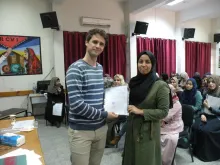The United Nations Relief and Works Agency for Palestine Refugees in the Near East (UNRWA) is leading efforts to aid Palestinians in Gaza. In addition to managing schools and business development platforms, the agency recently collaborated with the United Nations Volunteers (UNV) programme to re-organize a youth volunteer programme. This is a lifeline for youth in the State of Palestine, leveraging their capacities to address unmet community needs, whilst increasing career readiness at the same time. For the International Day of Solidarity with the Palestinian People, we celebrate these achievements.
In the Middle East and North Africa (MENA), refugees, displaced persons and women are particularly vulnerable to economic shocks because they are disproportionally represented in the labor market as either informal laborers or underpaid and unpaid caregivers.
Indeed, over 60 per cent of the working age population in the MENA region participates in the labor market informally, where there are limited workplace protections and few opportunities to acquire benefits or savings. Resiliency is mitigated in this environment and the economic crisis across the MENA region has led to increased demand for aid—vastly exceeding the capacities of local organizations and state agencies. In the Palestinian territory of Gaza, it is especially severe.
There are about 1.9 million people living in Gaza, State of Palestine, including 1.4 million refugees. Longstanding conflicts have stalled economic opportunities, leading to an unemployment rate of over 40 per cent among adults and a 20 per cent labor participation rate among women.
Alarmingly, the youth unemployment rate is over 60 per cent and UNRWA estimates up to 80 per cent of the population in Gaza is currently dependent upon international aid.
UN Volunteer Mikael Merker (Sweden) serves as a Project Coordinator with UNRWA on an assignment fully funded by the the Swedish International Development Cooporation Agency (Sida). After obtaining his Master’s degree, Mikael supported the recruitment, training and monitoring processes for a newly redesigned volunteer programme. This was redesigned as a capacity building exercise for recent graduates from universities in Gaza, including underrepresented women. The first cadre of 50 women and 33 men joined UNRWA in June 2019 for a 6-month term.
Together with UNRWA unit leaders, Mikael led induction workshops and paired volunteers with supervisors for specialized training based upon their fields of study and career objectives. These connections were especially important to Mikael who says, "As a new graduate myself, the aim of this intervention resonated strongly with me."
There was also an increased demand for UNRWA support because of the economic crisis and volunteers became vital to field teams. In addition to helping rebuild schools, Mikael says volunteers have been "collecting data for poverty assessments, conducting information sessions on sexual and reproductive health and developing physiotherapy training programmes for severely injured patients." They also performed administrative roles, participating in knowledge sharing, management and human resources activities that identified other talented youth for volunteer and staff vacancies.
These administrative roles were critical to UNRWA’s rapid response efforts, ensuring staff were recruited and deployed to keep pace with the needs on the ground. For instance, UNRWA Volunteer Ola Ghunaim says, "I volunteered as a Human Resources Clerk and supported recruitment activities, including testing and interviews. It was eye-opening to be part of the process of hiring new talent and connecting people to new opportunities." Volunteers also had access to professional development sessions and in some cases, have already accepted new job opportunities.
I competed for a Programme Administrative Assistant position and got the job. It was competitive, but because of the skills I developed at UNRWA, I stood out among the candidates. The volunteer experience helped me accomplish more than I thought I could. This is a whole new world for graduates like me. --Haya Dahrouj, a participant in UNRWA's Volunteer programme
Wafa Diyab, UNRWA's Human Resources Career Management Officer, was involved prior to Mikael's arrival. She is amazed at the transformation he led. Wafa says, "At first, we did not consider the volunteer programme a professional experience. The process of recruitment and training was limited, with few established procedures. Mikael improved the intervention, creating structure and defining the scope of work. It now represents a deliberate effort to decrease the unemployment rate and prepare youth for the labor market. For the first time, it is a professional experience."
Recruitment is underway for a new cadre of 150 volunteers – nearly double the size of the first group. They will be critical to UNRWA's COVID-19 response and help accelerate existing training, disability inclusion and youth engagement efforts. UN Volunteers and UNRWA are therefore at the forefront of the crisis, tackling unemployment and making sure no one is left behind.

